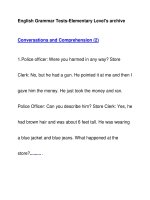Grammar terms beginning with letters d and e
Bạn đang xem bản rút gọn của tài liệu. Xem và tải ngay bản đầy đủ của tài liệu tại đây (8.25 KB, 1 trang )
Grammar terms beginning with letters D and E
Double negative
A construction in which two or more negative words occur in a single clause.
Examples are:
I don’t have nothing to prove.
I didn’t see nothing.
Double negatives are common in colloquial English. Formerly they were also acceptable in standard English, but
now they are regarded as non-standard.
Note that a double negative is not equivalent to a positive. For example ‘I don’t have nothing to prove’ doesn’t
mean ‘I have something to prove’. It just happens to be a non-standard but understandable way of saying ‘I
have nothing to prove’.
Ellipsis
The omission of word or words which is logically required to complete a sentence.
Examples
Seen James? (= Have you seen James?)
Got a problem. (= I have got a problem.)
Embedded question
A question which is not being asked directly. An embedded question merely forms part of a larger sentence,
which may or may not be a question.
I wondered why she was angry with me. (Here the sequence ‘why she was angry with me’ is an embedded
question.)
I don’t know what I should do. (Embedded question – what I should do)
Note that in an embedded question the subject comes before the verb.
Ergative verb
A verb which can be either intransitive or transitive. Examples are: sink, ring, boil, explode etc.
The explosion sank the ship. (Here the ergative verb sank is used transitively because it has an object.)
The ship sank suddenly. (Here the ergative verb sank is used intransitively because it does not have an object.)
Stay on top of your writing! Download our grammar guide from www.englishgrammar.org to stay up-to-date.
Powered by TCPDF (www.tcpdf.org)









